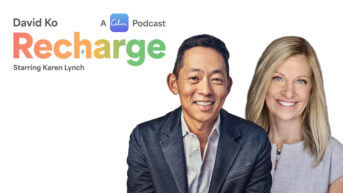Winding down Season 2 of the Recharge with David Ko podcast, Calm CEO David Ko welcomed Karen S. Lynch, a highly respected leader and trailblazer in healthcare, for a conversation about mental health and leadership.
She opened up about the profound impact of her mother’s suicide when she was 12, and how, as a leader, she eventually found the courage to share her story to help destigmatize mental health challenges. A former CEO of Aetna and CVS Health, Lynch also talked about the importance of whole-person care and delivering a simpler health and benefits experience for employees.
Here are three takeaways from their discussion.
1. Leaders can make a big impact on people’s lives by sharing their mental health stories
By using their platforms to share their personal stories, experiences, and challenges, leaders have the opportunity to normalize talking about mental health, Lynch said.
After years of feeling ashamed of her mother’s suicide, she realized that her leadership role gave her the opportunity to make a positive difference in people’s lives. She decided during a company town hall to share her story, with the hope of normalizing discussion about mental health.
“We were talking a lot about mental health and physical health at the time, and we were doing a strategy to really combine the two. And I sit on stage and as a leader, I thought, I have to share my story. How can I get people to follow me if I’m not telling the truth about what really happened to me?
“I felt relieved because I wasn’t hiding anything. For me, honesty is a bridge to truth. And really that’s what I created that day, that kind of overall bridge to truth.”
Hearing Lynch’s story, employees lined up to share their own mental health stories with her.
“I’m so glad I talk about it, because if it impacts just one person to have that conversation around suicide, I’ll feel gratified,” said Lynch. “Silence doesn’t protect us. Talking about it helps a lot.”
She stressed the need for leaders to illuminate the path forward and provide clarity in the actions they’re taking on that path. As more leaders open up about mental health, she hopes more people will get the help they need sooner.
2. We must connect mental and physical health to make America healthy
If we want people to live healthier, happier, and more productive lives, we need to treat them holistically. If we keep mental and physical healthcare separate, “we’re not going to be as healthy individuals as we need to be,” said Lynch.
She pointed to people who experience cancer. “Nine times out of 10,” they’re going to suffer from depression. Similarly, women aren’t getting adequate support for postpartum depression during pregnancy or just after giving birth.
“I don’t think I’ll be satisfied until there’s not the difference between mental and physical health,” Lynch said. “That when people have brought it together, you can’t talk about diabetes and cancer without talking about depression. You can’t talk about having a baby without talking about postpartum depression.”
In addition to leaders opening up the mental health conversation, Lynch emphasized the need to
- Expand the pipeline of people coming into the mental health profession through training and scholarship programs.
- Leverage technology and telehealth, because rural America doesn’t have the access they need.
- Drive policy reform, particularly in reimbursement, because mental health providers are underpaid.
“There’s not one single answer,” Lynch said. “There are many things that need to happen in this space.”
3. Simplicity is key to driving employee access and engagement
Although more companies are promoting their mental health and wellbeing resources, they can still do more, said Lynch. “I don’t think you ever can do enough. I think that a lot of companies don’t talk about it and don’t prioritize it.”
Organizations that don’t prioritize mental health wind up seeing negative consequences, she added. “If you’re not promoting the resources that are available, it will be costly in the end,” in the form of higher medical costs and lower productivity. “Reality is you’re not getting the best productive workforce if they’re not paying attention to their own mental wellbeing.”
Beyond driving awareness, employers need to make it simple for employees to find and use the resources available to them, Lynch and Ko underscored. “We spend a lot of time on the road talking to so many employers,” said Ko, “and I feel like they’re overwhelmed on the benefit management side—that they’ve got a sea of apps to choose from and not a lot of engagement.”
“Healthcare should be seamless,” said Lynch. “We don’t want all these different apps, because what you want is simplicity. . .How simple and easy is it to get the information for your employees so they get the access? And a lot of times it’s hard and they’re not. They need it fast; they need it now. They don’t need 15,000 different apps, so I would encourage simplicity, simplicity, simplicity.”
For more insights from Lynch, including wisdom she gained from her mentor and the aunt who raised her, listen to the full podcast on on Spotify, Apple, Amazon, YouTube or anywhere you get your podcasts.




